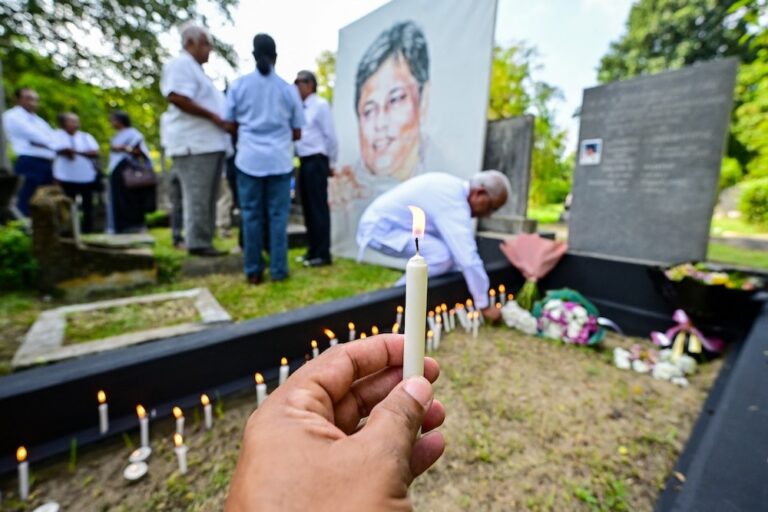(FMM/IFEX) – The following is a 25 February 2008 FMM press release: Confiscation of PC belonging to NGO head raises questions on the freedom of expression in Sri Lanka 25 February 2008, Colombo, Sri Lanka: The Free Media Movement (FMM) is both surprised and disturbed to learn that the Criminal Investigation Division (CID) has taken […]
(FMM/IFEX) – The following is a 25 February 2008 FMM press release:
Confiscation of PC belonging to NGO head raises questions on the freedom of expression in Sri Lanka
25 February 2008, Colombo, Sri Lanka: The Free Media Movement (FMM) is both surprised and disturbed to learn that the Criminal Investigation Division (CID) has taken into custody a computer used by Dr. Rama Mani, the former Executive Director of the International Centre for Ethnic Studies (ICES), to check for “controversial” correspondence, as reported by “The Sunday Times” on 24 February.
The events leading up to and surrounding Dr. Mani’s forced and hurried departure from Sri Lanka and other matters of organisational administration internal to ICES are not our concern here. Our interest is to strengthen the open exchange of competing ideas that we strongly believe and affirm are a cornerstone of a vibrant democracy. Dr. Mani had an inalienable right to hold her own opinions and ideas, to articulate them, to promote them and discuss them with friends, colleagues and associates in Sri Lanka and internationally. This is fundamentally the freedom of expression.
Furthermore, the FMM has for years called for Right to Information legislation that holds all public bodies, including non-governmental organisations (NGOs), accountable for their actions and transparent in their initiatives. Sadly, this regime has clearly indicated that it will not countenance such legislation because it would place it in a spot of bother if the public were allowed scrutiny into its familial workings. Given the absence of such legislation and that even “controversial” ideas fall under the rubric of democracy, we find the confiscation of Dr. Mani’s PC by the CID to be entirely absurd and an action that can only be interpreted as a thinly veiled tactic to intimidate civil society in Sri Lanka.
We are also concerned by the reporter’s point that “initial investigations into the files contained in all the other computers at ICES have not found any reference to R2P [Responsibility to Protect] and hence the CID has now taken Dr. Mani’s computer into its custody.” This peculiar reasoning raises the question as to whether mere reference to R2P is now enough in Sri Lanka for the CID to interrogate members of civil society. By extension, we are compelled to believe that media and civil society can no longer openly debate and promote issues related to the concept of R2P or other “controversial” ideas, lest the CID confiscate all PCs, mobile phones and notepads belonging to them.
We note with deep regret and concern that Sri Lanka is the third most dangerous country in the world for media personnel and journalists. It is the worst ranking Sri Lanka has received to date on not one, but many press freedom rankings. There is no media freedom left to speak of. With total impunity, the Government openly names and shames journalists and civil society activists as traitors and terrorists and openly calls for tighter State censorship. Physical violence against media personnel and journalists occurs with total impunity. Tragically, the Sri Lankan Police themselves have been implicated in attempts to abduct senior journalists and are themselves responsible for undermining media freedom. Government MPs who run amok in media institutions go scot free, while journalists who courageously stand up in the face of intimidation are violently attacked, threatened and are subject to interrogation by Police.
In such a context, the confiscation of equipment on the incredible basis of searching for references to “controversial policies” smacks of the worst kind of overt State censorship – control by fear and violent intimidation. Dr. Mani’s case joins the astonishing number of other incidents, documented by the FMM and other local and international rights groups, related to journalists, civil rights and media trade union activists and others who have been systematically and repeatedly threatened, attacked and silenced over the past two years. The regime’s unwillingness to listen to and acknowledge these significant concerns is a clear indication of a disturbing and continuing complicity in the significant erosion of the freedom of expression, media freedom and democratic governance in Sri Lanka.
It is in this light that the FMM expresses its serious concern that the action by the CID to confiscate Dr. Mani’s computer is an indicator of a vicious witch-hunt against those who hold, articulate and promote ideas contrary to those sanctioned by a regime uninterested in democratic governance and the freedom of expression.
For further information, contact the Free Media Movement, 237/22, Wijeya Kumaratunga Road, Colombo 05, Sri Lanka, tel: +94 777 312 457, +94 11 257 3439, fax: +94 11 471 4460, e-mail: fmm@sltnet.lk, Internet:
http://www.freemediasrilanka.org


